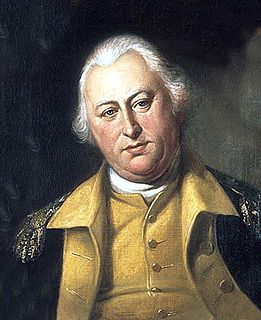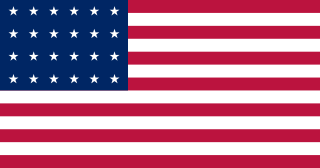
Columbia is a city in Marion County, Mississippi, which was formed six years before Mississippi was admitted to statehood. Columbia was named for Columbia, South Carolina, from which many of the early settlers had migrated. The population was 6,582 as of the 2010 census. It is the county seat of Marion County.

Benjamin Lincoln was an American army officer. He served as a major general in the Continental Army during the American Revolutionary War. Lincoln was involved in three major surrenders during the war: his participation in the Battles of Saratoga contributed to John Burgoyne's surrender of a British army, he oversaw the largest American surrender of the war at the 1780 Siege of Charleston, and, as George Washington's second in command, he formally accepted the British surrender at Yorktown.

The Territory of Arkansas, officially the Territory of Arkansaw, and commonly known as the Arkansas Territory or the Arkansaw Territory, was an organized incorporated territory of the United States that existed from July 4, 1819, to June 15, 1836, when the final extent of Arkansas Territory was admitted to the Union as the State of Arkansas. Arkansas Post was the first territorial capital (1819–1821) and Little Rock was the second (1821–1836).
Jesse Franklin was the Democratic-Republican U.S. senator from the U.S. state of North Carolina between 1799 and 1805 and between 1807 and 1813. He later served as the 20th Governor of North Carolina from 1820 to 1821. Franklin was the brother of Meshack Franklin, who also served in Congress.

Benjamin Williams was the 11th and 14th Governor of the U.S. state of North Carolina, from 1799 to 1802 and from 1807 to 1808. He was the first of two North Carolina Governors since the American Revolution to serve nonconsecutive terms.
John Culpepper was a Congressional Representative from North Carolina.

Samuel Whiteside was an Illinois pioneer. A farmer and backwoodsman, Whiteside briefly served in the Illinois General Assembly after statehood and led the Illinois militia for decades, rising to the rank of general but also enlisting as an ordinary soldier when militia calls declined at the end of wars. Whiteside fought the British in the War of 1812 and Native Americans through the Blackhawk War.
Robert Love was an American Revolutionary War soldier from Virginia and a political leader in North Carolina.

Erastus Root was an American lawyer and politician from New York.
John Geddes was the 47th Governor of South Carolina from 1818 to 1820.
The Fendall family was a prominent American political family that had its beginnings when Josias Fendall immigrated to Maryland in the early 1650s. He was appointed the 4th proprietary Governor of Maryland from 1656 to 1660.

Milton King Alexander was an American politician and militia officer who served during the War of 1812, the Seminole Wars and, most notably, as a brigadier general during the Black Hawk War.
The Columbian Institute for the Promotion of Arts and Sciences (1816–1838) was a literary and science institution in Washington, D.C., founded by Dr. Edward Cutbush (1772–1843), a naval surgeon. Thomas Law had earlier suggested of such a society "at the seat of government." It was the first "learned society" established in Washington and was organized on June 28, 1816, sixteen years after the city was occupied, and less than two years after the invasion by the British troops. The second article of its constitution states: "The Institute shall consist of mathematical, physical, moral and political sciences, general literature and fine arts."

Lt. Colonel John Bond Jr. was an American military officer, Mississippi pioneer, and Mississippi Legislator.

Benjamin Franklin Randolph was an American educator, an army chaplain during the Civil War, and a Methodist minister, newspaper editor, politician, and state senator in the early part of the Reconstruction Era in South Carolina. Randolph was selected to be one of the first African American Electors in the United States at the 1868 Republican National Convention for the Ulysses Grant Republican presidential ticket. Randolph also served as the chair of the state Republican Party Central Committee. He was a delegate to the 1868 South Carolina Constitutional Convention, where he played an important role in establishing the first universal public education system in the state, and in granting for the first time the right to vote to black men and non-property owning European-American men. On October 16, 1868, Randolph was assassinated by members of the KKK.
The Wilmington District Brigade was an administrative division of the North Carolina militia during the American Revolutionary War (1776–1783). This unit was established by the North Carolina Provincial Congress on May 4, 1776, and disbanded at the end of the war.
Benjamin Exum (1725-1789) was an officer in the North Carolina militia during the American Revolution and a Senator in the North Carolina General Assembly from Dobbs County.
The Dobbs County Regiment was a unit of the North Carolina militia that served during the American Revolution. The regiment was one of thirty-five existing county militias that were authorized by the North Carolina Provincial Congress to be organized on September 9, 1775. All officers were appointed with commissions from the Provincial Congress. On May 4, 1776, the regiment was placed under the command of the New Bern District Brigade commanded by Brigadier General Richard Caswell. The regiment was active until the end of the Revolutionary War in 1783 and was engaged in twelve known battles and skirmishes in North Carolina, South Carolina and Georgia.
The Wayne County Regiment was a unit of the North Carolina militia that served during the American Revolution. The North Carolina General Assembly created Wayne County and its regiment of militia out of part of Dobbs County and its regiment of militia on November 2, 1779. The officers were appointed and commissioned by the Governor of North Carolina. The regiment was disbanded at the end of the war.
The North Carolina General Assembly of April to June 1784 met in Raleigh from April 19 to June 3, 1784. The assembly consisted of the 120 members of the North Carolina House of Commons and 50 senators of North Carolina Senate elected by the voters in April 1784. As prescribed by the 1776 Constitution of North Carolina, the General Assembly elected Alexander Martin to continue as Governor of North Carolina. In addition, the assembly elected members of the Council of State.
Hebert Bourne - The Columbian-Progress, August 18, 1994.








